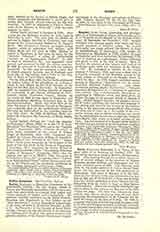

Badius, RAPHAEL, a Florentine Dominican of the seventeenth century. He was deeply versed in Tuscan and Florentine antiquities, and his researches made him particularly conversant with quaint and curious matters of history and hagiography. He rendered valuable assistance to the Jesuit Fathers, Henschen and Papebroch, in their labors on the “Acta Sanctorum”, as they themselves acknowledge (T. II, Junii, ad diem X, de Joanne Dominici, p. 395, n. 6). As Chronicler of the Convent of Santa Maria Novella, Florence, he was also known to the historian and bibliographer Cinellus, who makes frequent and grateful mention of the learned Dominican’s helpful knowledge of the literature and writers of Florence (Bib. Volante, Scanzia VI, 88; IV, 87; XII, 106). In 1681, he was Dean of the University of Florence.
JOHN R. VOLZ

